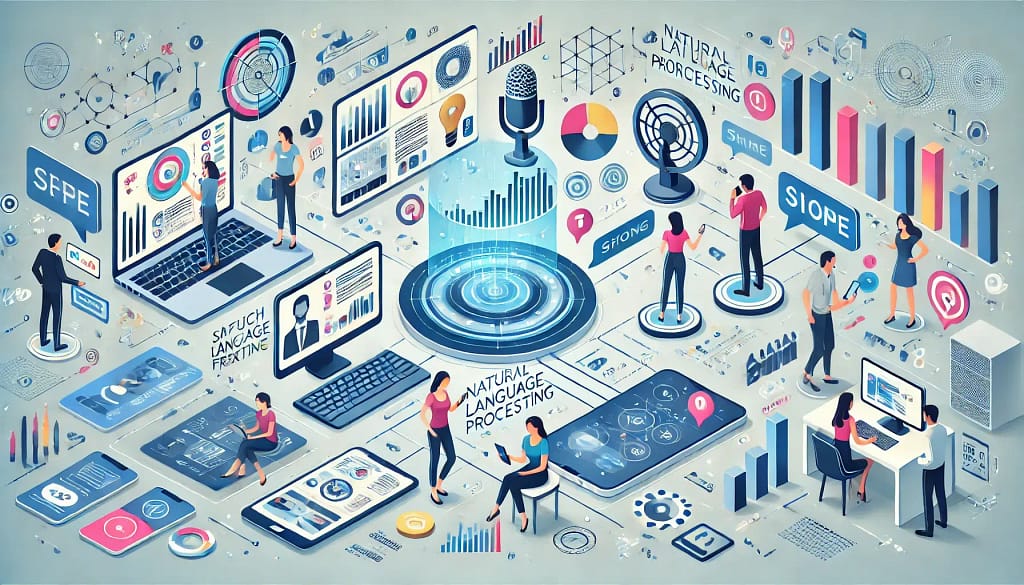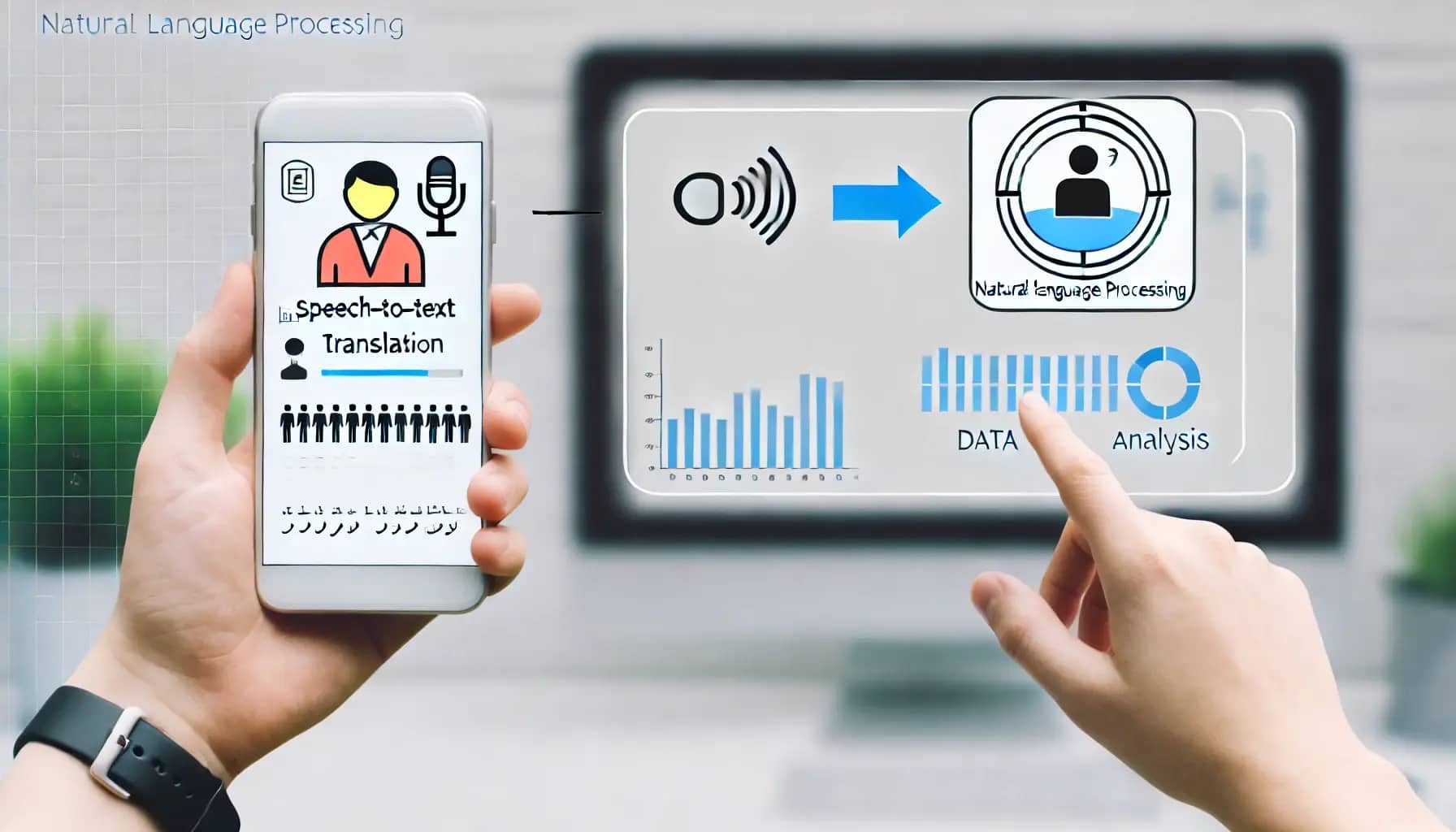Natural language processing (NLP) is transforming how we interact with technology through artificial intelligence, computational linguistics, speech recognition, and speech tagging. From chatbots to translation services, NLP powered by artificial intelligence, natural language understanding, machine learning algorithms, and speech recognition powers many applications we use daily. This field combines linguistics, computer science, and AI, using deep learning and neural network techniques, to enable machines to understand and respond to human speech. Originating in the 1950s, NLP has evolved rapidly, thanks to advances in machine learning, natural language understanding, and big data. Today, it’s essential for businesses aiming to improve customer service and streamline operations using machine learning and Google Cloud for processing tasks.
Key Takeaways
- Understand NLP Basics: Natural Language Processing (NLP) is a field that bridges human language and computer understanding, crucial for enhancing machine communication through linguistics, deep learning, and a word-based approach.
- Improve Communication: NLP technologies can significantly enhance communication by enabling more intuitive interactions between humans and machines, such as through chatbots and virtual assistants, using natural language processing and advanced language models.
- Boost Data Analysis: Implementing natural language processing (NLP) and machine learning can transform data analysis by extracting meaningful insights from vast amounts of unstructured text data, making it easier to understand trends and patterns.
- Optimize SEO Content: NLP tools can streamline SEO content writing by analyzing keywords and user intent, helping to create more effective and targeted content strategies using natural language processing.
- Future Prospects: The future of NLP in tech-driven worlds looks promising, with ongoing advancements in natural language processing likely to further integrate NLP into various industries, from healthcare to finance.
Unveiling Natural Language Processing
Core Concepts
Natural Language Processing (NLP) focuses on interactions between computers and human languages. It enables computers to understand and generate human language. NLP involves several core concepts:
- Syntax: The arrangement of words to form sentences.
- Semantics: The meaning of words and sentences.
- Pragmatics: How context influences the interpretation of language.
These concepts help computers in processing language in a way that is similar to humans.
Evolution and Growth
NLP has evolved rapidly since its inception. In the 1950s, researchers began exploring machine translation. By the 1980s, statistical models became popular. These models used probabilities to predict the structure and meaning of text in natural language processing.
In recent years, deep learning has transformed NLP. Technologies like transformers and neural networks have improved natural language processing accuracy significantly. BERT, introduced by Google in 2018, revolutionized natural language processing and understanding of context in sentences.
Key Technologies
Several key technologies drive NLP today:
- Tokenization: Splitting text into smaller units like words or phrases in natural language processing.
- Named Entity Recognition (NER): Identifying entities such as names, dates, and locations in natural language text.
- Sentiment Analysis: Determining the emotional tone behind a series of words in natural language.
- Machine Translation: Automatically converting text from one language to another.
These technologies enable applications like natural language chatbots, translation services, and voice assistants.

Enhancing Communication with NLP
Breaking Language Barriers
NLP helps break language barriers. It allows people from different countries to communicate easily. For example, Google Translate uses NLP to translate text between languages. This makes it easier for travelers and business professionals to understand each other.
NLP also helps in education. Students can learn new languages with apps like Duolingo. These apps use NLP to provide real-time feedback and corrections.
Real-time Translation
Real-time translation is a significant achievement of NLP. Devices like the Pocketalk Translator offer instant translation of spoken words. This technology is vital for international meetings and travel.
Real-time translation has improved over the years. Early versions were slow and inaccurate. Today, modern algorithms provide faster and more accurate translations. This helps in emergency situations where quick communication is essential.
Chatbots and Assistants
Chatbots and virtual assistants have become common due to NLP. They help businesses provide customer service 24/7. Amazon’s Alexa and Apple’s Siri are popular examples of virtual assistants that use NLP.
These assistants can perform tasks like setting reminders, playing music, or answering questions. They understand natural language commands, making them user-friendly. Businesses benefit by using chatbots for customer inquiries, reducing wait times, and improving satisfaction.
Transforming Data Analysis
Sentiment Analysis
Sentiment analysis helps companies understand customer opinions. It identifies emotions in text data. For example, it can analyze social media posts. This helps brands see if customers are happy or upset.
Businesses can respond faster to issues. They can also improve their products based on feedback. Sentiment analysis uses machine learning algorithms. These algorithms classify text as positive, negative, or neutral.
Text Mining Techniques
Text mining techniques extract valuable information from large text datasets. One common method is keyword extraction. This identifies important words in a document.
Another technique is named entity recognition (NER). NER finds and classifies names of people, places, and organizations in the text. These techniques help in organizing unstructured data.
They also assist in discovering patterns and trends. For instance, researchers use text mining to analyze scientific papers. This helps them find relevant studies quickly.
Automated Summarization
Automated summarization creates short summaries of long documents. This saves time for readers who need quick information. There are two main types: extractive and abstractive summarization.
Extractive summarization selects key sentences from the original text. Abstractive summarization generates new sentences that convey the main idea. Both methods rely on NLP models.
Streamlining SEO Content Writing
Keyword Optimization
Natural language processing (NLP) helps optimize keywords. It analyzes vast amounts of text data. This analysis identifies the most relevant keywords for your content.
By using NLP, writers can find high-impact keywords. These keywords improve search engine rankings. Tools like Google Keyword Planner and SEMrush use NLP for this purpose.
Content Relevance
NLP ensures content remains relevant. It examines current trends and user behavior. This examination helps in creating up-to-date content.
NLP tools can compare your content with top-ranking pages. They suggest improvements to match or exceed competitors’ quality. This keeps your content fresh and engaging.
User Intent Matching
Understanding user intent is crucial for SEO. NLP deciphers what users are truly searching for. It goes beyond mere keyword matching.

Future of NLP in Tech-Driven Worlds
Predictive Analytics
Predictive analytics uses historical data to forecast future outcomes. NLP enhances predictive analytics by analyzing text data from social media, reviews, and other sources. Companies can predict trends and customer behavior. For example, a business might predict product demand based on customer reviews.
Banks use NLP to predict fraudulent transactions. By analyzing transaction descriptions, they detect unusual patterns. This helps prevent fraud and protect customers.
Voice Search Optimization
Voice search is becoming more popular. People use voice assistants like Siri and Alexa daily. Optimizing for voice search involves understanding natural language queries. Traditional SEO focuses on keywords, but voice search requires understanding questions and context.
Businesses need to adapt their content for voice search. This means using conversational language in their content. It also means answering common questions directly. This improves their chances of appearing in voice search results.
Ethical Considerations
NLP raises ethical concerns. One issue is privacy. Analyzing personal data can invade people’s privacy if not handled correctly. Companies must ensure they follow privacy laws and guidelines.
Bias in NLP algorithms is another concern. If the training data is biased, the algorithm will be too. This can lead to unfair treatment of certain groups. Developers need to ensure their data is diverse and representative.
Summary
Natural Language Processing (NLP) is revolutionizing how we interact with technology. From enhancing communication to transforming data analysis, NLP’s impact is undeniable. It’s reshaping SEO content writing and driving future tech innovations.
You’re at the forefront of this change. Embrace NLP to stay ahead in your field. Explore its potential, apply it in your work, and watch your efficiency soar. Ready to dive deeper? Start now and transform your approach today.
Frequently Asked Questions
What is Natural Language Processing?
Natural Language Processing (NLP) is a field of AI that focuses on the interaction between computers and human language. It enables machines to understand, interpret, and generate human language.
How does NLP enhance communication?
NLP improves communication by allowing machines to understand and respond to human language. This leads to more intuitive interfaces and better customer service experiences.
Can NLP transform data analysis?
Yes, NLP can analyze large volumes of text data quickly. It extracts meaningful insights, identifies patterns, and helps in making data-driven decisions.
How does NLP streamline SEO content writing?
NLP optimizes content by analyzing search intent and keyword relevance. It helps in creating high-quality, SEO-friendly content that ranks better on search engines.
What is the future of NLP in tech-driven worlds?
The future of NLP includes advancements in machine learning and AI. This will lead to more sophisticated language models, improved human-computer interactions, and new applications in various industries.
Why is NLP important for businesses?
NLP automates tasks like customer support, data analysis, and content creation. It saves time, reduces costs, and enhances overall efficiency.
Are there any ethical concerns with NLP?
Yes, ethical concerns include data privacy, bias in algorithms, and misuse of technology. It’s crucial to develop responsible AI practices to address these issues.






